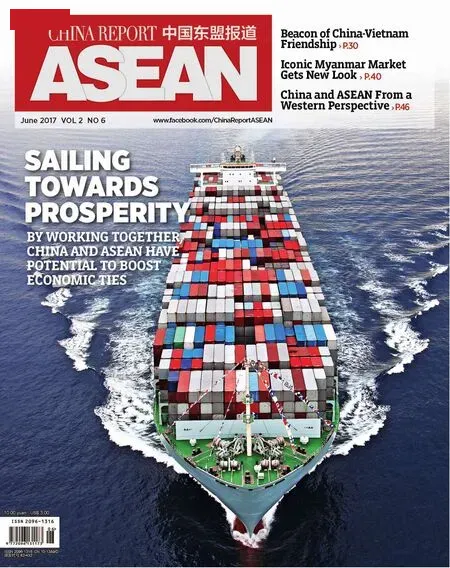FUZHOU FAIR CONNECTS ASEAN BUSINESSPEOPLE WITH CHINESE MARKET
By Wang Jiping
FUZHOU FAIR CONNECTS ASEAN BUSINESSPEOPLE WITH CHINESE MARKET
By Wang Jiping
At fair focused on economy and trade, improving connectivity leaves wide room for opportunity across a range of markets
The 21st-Century Maritime Silk Road Exhibition Area was one of the highlights of the 19th Cross-Straits Fair for Economy and Trade (CFET), which kicked off at the Strait International Conference & Exhibition Center in Fuzhou, capital of southeastern China's Fujian Province, on May 18. The fair was attended by a large number of businesspeople from ASEAN member states.
ASEAN countries have played a unique and important role in the construction of the Maritime Silk Road. Therefore, the perspectives of ASEAN businesspeople relating to the project, as well as their experiences at the CFET, are crucial.
Infrastructure Does Matter
Maryati Oetaminingsih of Madhura Adhidaksa, a traditional costume and luggage manufacturer based in Indonesia, said she found Fuzhou to be a city of surprising freshness. She was impressed by the city’s convenient and advanced transportation infrastructure from the moment she got off the plane.
“From the airport to Fuzhou’s downtown to the exhibition center, the whole process of transportation was really quite convenient," Oetaminingsih said. "We could choose to either ride in an airport shuttle bus or get a taxi very easily, which is often impossible in Indonesia."
Oetaminingsih added that Gushan Bridge, the first singletower self-anchored suspension bridge in Fuzhou, impressed her the most. When she passed over the bridge by car, she saw not only picturesque scenery but also a number of logistics vehicles fully loaded with cargo whizzing by.
“Compared to China, Indonesia's logistics makes me upset," Oetaminingsih said. "Although Indonesia is a country of thousands of islands, it lacks bridges linking the islands. The transport capacity of ports is very limited, and the construction of transportation infrastructure such as railways also lags behind."
Poor infrastructure holds back the business of her company, Oetaminingsih added.
“As our company is committed to manufacturing genuine handmade traditional clothing, bags and suitcases, the quality of our products is absolutely guaranteed," she said. "But due to backward infrastructure, it is difficult for our products to be exported to foreign countries, which makes us fall behind."
Oetaminingsih brought more than 2,000 items of batik, the most widely recognized Indonesian national dress, and 25 handbags in a style unique to Indonesia to the CFET. She brought the items to gauge the popularity of such products among Chinese customers as well as the competitiveness of her company’s products, and to finalize preparations for plans to export batik in bulk in the future.
“The convening of the Belt and Road Forum for International Cooperation makes us confident towards the upgrade of infrastructure in Indonesia, and we have also gained a better and deeper understanding of the Belt and Road," Oetaminingsih said. "We are convinced that along with the construction of the Maritime Silk Road, we can work well with our Chinese counterparts."
Oetaminingsih said she has a lot of ideas for future development. For instance, along with the construction of the Maritime Silk Road, transportation by sea, air and rivers will become faster and more convenient, therefore giving her company easier access to the Chinese market. By studying Chinese customers’preferences and living habits, she can improve the attractivenessof her products in the Chinese market. Her company also plans to conduct cross-border business with Chinese e-commerce giants in order to spread sales across multiple platforms.
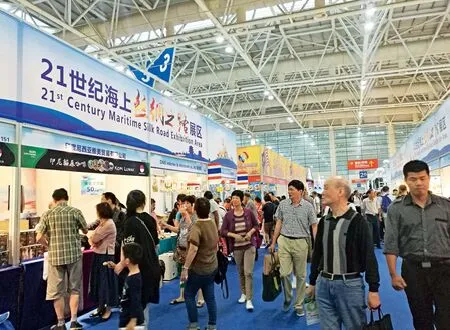
Top: Customers at the 21st-Century Maritime Silk Road Exhibition Area.
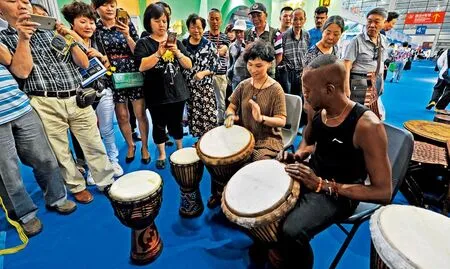
Middle: A Chinese visitor learns proper drumming technique
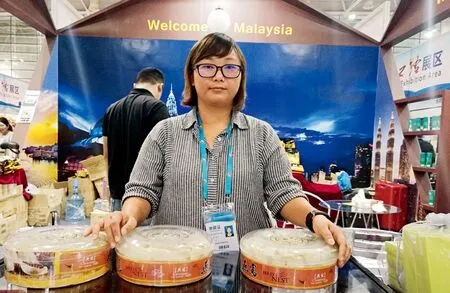
Bottom: Yau Sin Yee, a businesswoman from Malaysia, at the event.
Must-have Brand Awareness
Yau Sin Yee, a businesswoman from Malaysia, attended the CFET for the third time this year.
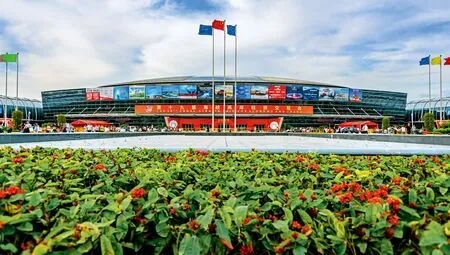
The 19th Cross-Straits Fair for Economy and Trade kicked off at the Strait International Conference & Exhibition Center in Fuzhou, the capital of Fujian Province, on May 18.
In Malaysia, Yau’s main job is running her family's cubilose business alongside her husband. At the beginning, they sold homemade cubilose. But as their business grew larger and tourism between China and Malaysia developed quickly, Yau and her husband found that their products were well received not just by local Malaysian customers, but also Chinese tourists. They learned from Chinese tourists that cubilose is a very important tonic in China, especially in tropical and subtropical regions such as Guangdong and Fujian provinces, where people like to use cubilose to make soup or congee. This information led Yau and her husband to explore the Chinese market further.
However, the couple soon discovered that tapping into the Chinese market cannot rely on word-of-mouth alone. Yau’s husband heard about the CFET from a Malaysia Tourism Promotion Board employee by chance and was excited to learn that the location of the event was Fujian, one of their target markets.
“We had no excuses not to come,” Yau said.
Yau added that compared to three years ago, Chinese consumers have grown more particular in their choices. Besides the cubilose’s taste, Chinese customers have also paid close attention to product details such as packaging and food safety certification logos. Some Chinese customers purchase cubilose as gifts for their relatives or friends, particularly consumers born in the 1980's and 1990's who have greater brand awareness.
“Nowadays, the internet is very well developed, and some young consumers with limited knowledge of cubilose seek to learn more about our products through scanning a QR code or searching online," Yau said. "But I regret to say that we haven't done enough to meet this technological need. I really learned an important lesson at this year's CFET."
After returning to Malaysia, Yau plans to push her business forward in two ways. She will continue to take advantage of WeChat (a Chinese instant messaging app) marketing so as to maintain a sound relationship with Chinese cubilose enthusiasts. In addition, Yau will work to improve product quality and introduce modernized and standardized production and marketing methods in an effort to meet international standards and expand brand influence.
- China Report Asean的其它文章
- FREIGHT TRAIN ROUTE LINKS VIETNAM, SOUTHWEST CHINA
- The CPC Grows Together with the Chinese People
- South and Southeast Asia Commodity Expo and Investment Fair Held
- COOPERATION WITH SINGAPORE GROWS
- Xi's Kazakhstan Trip Cements Broader Cooperation
- THAI PM SET TO SPEED UP THAILAND-CHINA RAILWAY PROJECT

